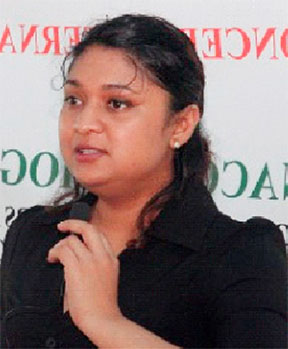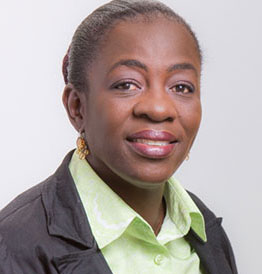Monies from the $52.2 billion earmarked for the education sector in the 2019 budget will be used for continuing curriculum reform which will see robotics and animation being taught in primary schools.
“It is no secret that a 40-year curriculum cannot deliver the breadth of skills for a 21st century generation,” Minister of Education Nicolette Henry yesterday told the National Assembly.
“I say to the people of this country, that your government will continue on a path of development. In 2019, the Ministry of Education will implement for the first time in Guyana, robotics, coding and animation in primary schools across this country. This will leverage the gains of smart classrooms, IT hubs in 2018,” she added.

Some $52.2 billion was set aside for the education sector in the 2019 budget, representing a 15.6 per cent increase from the monies allocated this year.
The Minister of Education’s contribution to the 2019 budget debates yesterday morning followed that of her predecessor; People’s Progressive Party/Civic (PPP/C) MP Priya Manickchand.
Manickchand said that while government boasts that huge sums are allocated for education, this year, some $2 billion was not used and returned to the Consolidated Fund for the 2018 period, and monies for this year have seen massive increases being allotted to non-education items, such as fuel and lubricants.
“The ministry this year is going to be doing that with the money that is being allocated to it. $18 billion sir, is a good number and I was very pleased. I was pleased that the ministry has seen an increase that has been allocated to it…but when you look at what the increase goes towards; 76% of the line item for fuel and lubricants has been raised by 76%, 58% increase towards transportation and costs, 54% towards other goods and services, almost 1.7 billion in operating cost. So this is not going towards buying stuff for children, putting programmes in place, implementing programmes, executing programmes,” she stressed.
Further, she added, “We learned…from this year’s budget, that in 2017, the ministry returned 2 billion to the Consolidated Fund. How can you return money and tell me that we have schools without text books? You come here and say we can’t afford to give 10k to each child? Well we could have given $15,000 to each child with the money you returned. You could have paid the teachers a better salary and prevented them from going in the streets and march and beg you for something they deserve and are entitled to. How can you be sending money back?”
She pointed to projects slated for next year, such as the construction of the Parfaite Harmonie and Kuru Kururu secondary schools, saying that she was grateful that Henry has continued with her government’s programme aimed at ensuring universal secondary education countrywide. However, she emphasized that more can and needs to be done.
It is to this end that she called on government to implement a number of plans the opposition had crafted.
“We demand that the Education Bill that was laid in the National Assembly in 2015 be brought back to this House. The Education Act is over 100 years old. It does not serve our children anymore and it cannot serve our children anymore. I laid a bill that was highly consulted on in 2015. We ask that the Commission of Inquiry report be laid in the National Assembly. Mr. (Joseph) Harmon, Minister of State, said that he will do that three years ago but he has not done that yet. If it is that you do not like it, then toss it out and tell us you are not using it but you cannot hide that from the nation,” Manickchand stated.
“…continue the early childhood education programme. That was a good programme that served 8,000 children but those children are now in grade one. What are we doing for the children that are now going in nursery? We call that a five-year plan we put on the table. It is the first time in the nation that we have gone on without a five-year sectoral plan,” she added.
Nurtures
Manickchand said that while Henry thinks her criticisms are not constructive, that view is to the contrary as she wants to see the sector thrive. “Contrary to what the minister believes, I would like to see the ministry succeed. This is a ministry that nurtures Guyana’s children. It is a ministry that people will see the people of Guyana. It will determine how we look 10 years from now, 20 years from now; there is space for us to work together if the minister was not so fearful and insecure of other opinions,” she said.
She called on Henry to bring back inter-party discussions on education as she had implemented, where she said programmes were discussed with all sides of the House before they were rolled out.
Henry used part of her presentation as a rebuttal to Manickand’s position that teachers could be paid more, reminding her that the issue of debunching monies for the teachers spanned many years and three governments unsettled until she was able to bring a resolution this year.
She said that her ministry also understands that for holistic educational development, teachers need specialized training and programmes geared to help them deliver better in the classrooms. To this end, Henry said that hundreds of teachers have been trained in the technical and vocational disciplines, in addition to many having undergone special education and literacy training, and those who have been exposed to the Caribbean good practice guide for early childhood educators, with a hope of equipping them with the skillsets needed for producing well- rounded students.
And the importance of the arts and physical education were not left out as the Minister of Education announced plans for the upgrade of schools’ music and physical education programmes. “Music and Physical Education will continue to be expanded and strengthened in 2019 with procurement of musical instruments, such as pianos, guitars, recorders and steel pans for schools across this country. Plans are also on stream for a hospitality institute established here, Henry said, but did not go into detail.
Special Education will see significant sums going towards implementing programmes for students in that category, “with improved training and staffing requirements being addressed.” She said that while she admits there is much more that has to be done for special education students, if the process was initiated years ago, all the ministry would have had to do now was build on programmes already there.
The Minister of Education said that Budget 2019’s monies will be spent on a number of programmes, many of which will be continuations and upgrades of some already implemented, such as the government school feeding programme.
“In 2019 the programme will be further enhanced to meet the needs of all students in all ten administrative regions,” she said.
Turning to the University of Guyana, Henry said that as Guyana prepares for the emerging oil and gas sector, UG will begin offering programmes catered for the sector, such as a diploma course and a Master of Science course in petroleum engineering.
“The sum of $52 billion allocated to this sector will be invested in the construction of schools, curriculum reform, psychological and other support services, teachers’ preparation and support, including scholarships for teachers, school feeding programmes, tertiary education, technical and vocational education music, and physical education,” Henry said.








